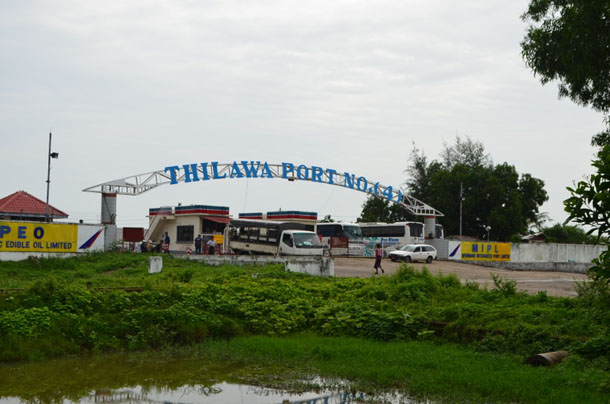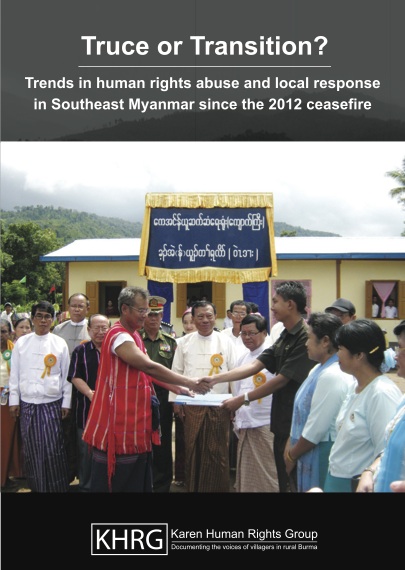Posts Tagged ‘Government of Myanmar’ (75 found)
Burma: Drop Draft Religion Law
(New York) – Burma’s parliament should scrap a proposed religion law that would encourage further repression and violence against Muslims and other religious minorities, Human Rights Watch said today. The draft law on religious conversions, published in the state-run media on May 27, 2014, would impose unlawful restrictions on Burmese citizens wishing to change their religion […]
• • •Rising Costs in Myanmar Put Strain on UNICEF’s Resources in Yangon
YANGON-The end of foreign sanctions and the opening up of Myanmar has benefitted millions of children paving the way for greater progress, however they have also led to higher operational costs for UN agencies and other aid organizations […]
• • •Truce or Transition? Trends in Human Rights Abuse and Local Response in Southeast Myanmar Since the 2012 Ceasefire
In January 2012, the Myanmar government and the Karen National Union (KNU) signed a preliminary ceasefire agreement, bringing to a halt what is often referred to as the world’s longest-running civil war. This conflict engendered severe human rights abuse of civilians at the hands of a range of armed actors, primarily at those of the Myanmar Armed Forces (Tatmadaw). The ceasefire and other recent political developments in Myanmar have altered the ways in which human rights abuse is experienced by Karen people in the Southeast, and transformed the context within which these abuses can be addressed. This report aims to demonstrate how trends in human rights abuse have changed during the post-ceasefire period […]
• • •Press Release – Special Adviser to the UN Secretary- General on Myanmar
The Special Adviser welcomes the constructive dialogue held between the Government of Myanmar’s Union Peace-making Work Committee and the Kachin Independence Organization in Myitkyiana on 13 May. The meeting was held against the backdrop of concerns about recent clashes between the Armed forces of Myanmar and the Kachin Independence Army […]
• • •Will Japan Become a Model of Irresponsible Development in Burma?
 As the Thilawa Special Economic Zone Project (Thilawa SEZ) forges ahead, anger over the treatment of the local communities who are being displaced is growing. The Japan International Cooperation Agency (JICA), who just signed a deal that formalizes the financing of Thilawa SEZ is treating the communities currently living on the site area with undisguised disdain, drawing ire from local and international organizations, including on their home turf.
As the Thilawa Special Economic Zone Project (Thilawa SEZ) forges ahead, anger over the treatment of the local communities who are being displaced is growing. The Japan International Cooperation Agency (JICA), who just signed a deal that formalizes the financing of Thilawa SEZ is treating the communities currently living on the site area with undisguised disdain, drawing ire from local and international organizations, including on their home turf.
Covering around 2,400 hectares of land, the Thilawa SEZ is located 20km outside Rangoon and will include factories, a deep sea port, housing developments and other infrastructure for transport and communications. The project is a joint effort between Japan and Burma, with the Burma government and domestic businesses holding a 51% stake and the Japan government and Japanese businesses owning a 49% stake with funding being channelled through JICA as part of Japan’s overseas development assistance. Yet in order for these components to go ahead thousands of local people will be displaced. Phase One of the project, which has already started, has seen the relocation of 300 villagers yet the relocation site consists of inadequate housing, no alternative farmland, a lack of a clean water supply and very few livelihood opportunities, leaving people in debt just a few months after moving […]
• • •BURMA: Letter to President Obama on Continuing National Emergency
Dear President Obama,
Our organizations urge you to continue the national emergency with respect to Burma. Since May 20, 2013, the Burmese government has failed to substantively address any of the concerns that informed the renewal of Executive Order 13619 […]
• • •Deciphering Myanmar’s Peace Process – A Reference Guide (2014)
The political sensitivity and scale of the peace negotiations and conflict have again posed a major challenge in collecting complete and accurate data for this book. While we have received the generous support of insider sources for our data, this remains far from gaining a complete picture of the myriad components of Myanmar’s peace process. We have also tried to the best of our ability to provide overview statistics that give a sense of the scale and impact of developments occurring over the past year […]
• • •United States Commission on International Religious Freedom’s 2014 Annual Report
Political reforms in Burma have not improved legal protections for religious freedom and have done little to curtail anti-Muslim violence, incitement and discrim¬ination, particularly targeting the Rohingya Muslim minority. Police failed to intervene effectively and the government has taken inadequate steps to address the underlying causes of sectarian violence or hold individ¬uals fully accountable. State-sponsored discrimination and state-condoned violence against Rohingya and Kaman ethnic Muslim minorities also continued, and ethnic minority Christians faced serious abuses during recent military incursions in Kachin state. Based on these systematic, egregious, ongoing violations, USCIRF continues to recommend that Burma be designated as a “country of particular concern,” or CPC, in 2014. The State Department has designated Burma a CPC since 1999 […]
• • •British Government Backs Burma Political Prisoner Review Mechanism
Foreign Office Minister Hugo Swire MP has backed ‘a comprehensive and transparent mechanism’ to review cases of political prisoners in Burma. He voiced his support in a letter responding to letters from the public about political prisoners in Burma […]
• • •Humanitarian Crisis Update for Kachin State and Northern Shan State
It has been more than 30 months since armed clashes between the Myanmar government armed forces and the Kachin Independence Army (KIA) forces were first rekindled in 2011, resulting in more than 120,000 IDPs. Despite the ongoing peace negotiations, skirmishes between the Myanmar government armed forces and the Kachin Independence Army (KIA) have been increasing […]
• • •









 All posts
All posts